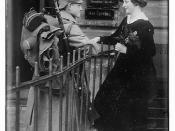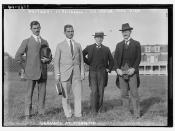Before considering whether or not Marranos, Renaissance Jews, and Court Jews were harbingers of Jewish modernity, the boundaries of Jewish modernity itself should be defined. Jewish modernity began in the seventeenth century where, "according to nearly all views today, many of the elements that become constitutive of later Jewish life made their appearance to any degree (Myer)." Each of the groups mentioned appeared after the Spanish Inquisition in the fourteenth century, and were thrown into unfavorable conditions by that expulsion.
The Marranos were the Sephardic Jews who converted to Christianity during the fierce persecutions of the late fourteenth century. However, the Marranos continued to practice Judaism secretly. Resentment against them led to riots and massacres and which were later intensified y the Inquisition. Finally in 1492 a royal edict forced all Jews who had not renounced their faith to be expelled from Spain. Many Marranos settled in North Africa and Western Europe.
By the eighteenth century, emigration and assimilation had led to the disappearance of Marranos from Spain.
Despite their constant persecution and double lives, Marranos played a part as harbingers of Jewish modernity. Marranos were largely responsible for the first dissensions against rabbinic Judaism. Rabbis held most of the power in this form of Judaism, which is still practiced by Jews worldwide. The first modern, secular Jew is considered to be Benedict de Spinoza. He was born in Amsterdam to Marrano parents. Spinoza was excommunicated for questioning some of the basic tenets of Jewish faith, for example, the divine authorship of the Scripture, rabbinic authority and, most significantly, the relevance of ritual as divine service (MF/R). He accepted his excommunication without regret and even rejected a friend's appeal to embrace Catholicism.
Another Marrano who shared Spinoza's view was Uriel Dacosta. He was born into the Roman Catholic Church,


![[German vehicle tax registration issued to George Grantham Bain] (LOC)](https://s.writework.com/uploads/6/60390/german-vehicle-tax-registration-issued-george-grantham-bain-thumb.jpg)